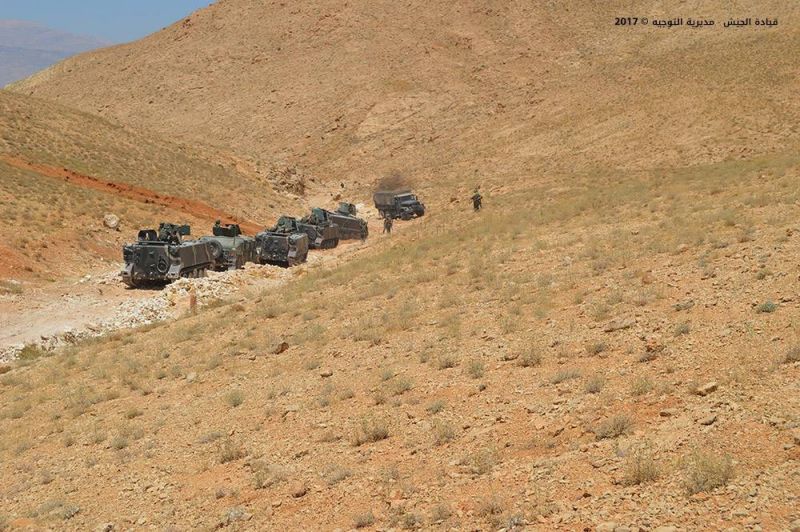
Lebanese Army soldiers during an operation in North Lebanon. (Courtesy of Lebanese Army website)
Lebanon has once again narrowly averted a crisis.
On Saturday, two individuals — Haitham and Malek Tawk — from the predominantly Christian town of Bsharri, North Lebanon, were tragically killed in an apparent conflict over water sources on the heights of Qornat al-Sawda in North Lebanon.
This long-standing dispute involves the majority-Christian town of Bsharri and the majority-Sunni locality of Bqaa Safrin in the Dinnieh district.
Almost immediately, Hezbollah’s opponents immediately accused the armed group of deliberately exacerbating the situation, amidst a backdrop of growing political polarization.
The presidential election, which has been ongoing for over eight months, has turned into a fierce battle between the Shiites, who back Marada Movement leader Sleiman Frangieh, and the majority of Christians who support former finance minister Jihad Azour.
Caught in this deadlock, both factions are vying for support from the Sunnis, who remain on the fence.
Christians versus Sunnis?
The conflict between the two towns has a longstanding history.
According to a security source who spoke to L’Orient-Le Jour, there are often minor altercations during the early summer, involving attempts to divert the watercourse or remove pipes.
“Last month, residents of Bsharri fired at the livestock belonging to Bqaa Safrin farmers following a heated exchange. But we didn’t think it would go any further than that,” said the security source.
“The incident provided an opportunity to fuel divisions between different communities,” said political scientist Karim Bitar.
He emphasized that political parties wasted no time in exploiting the situation for their own political gain.
“Clearly, they are fully committed to maximizing their political advantage.”
Charles Jabbour, a spokesperson for the Lebanese Forces (LF) — a party with strong support in Bsharri — on Saturday stated that Haitham Tawk fell victim to sniper fire.
While several local sources support the claim that the shot originated from armed residents of Bqaa Safrin, who are aligned with the pro-Hezbollah March 8 camp, press reports also suggested an internal dispute within the influential Tawk family.
While administrative sources at the government hospital in Bsharri disputed the claim that the young man’s death was caused by long-distance sniper fire, citing the bullet’s trajectory through his armpit and thigh, this perspective was contested by several political figures.
“Guns are relatively common among Lebanese citizens, but snipers are a different story,” said Jabbour. “Only a well-equipped army, such as Hezbollah, possesses them.”
The pertinent question, however, remains: Why would Hezbollah extend its reach to such an extent in an area with no significant Shiite presence?
A source close to the anti-Hezbollah March 14 camp said, “Firstly, as part of its military strategy, Hezbollah seeks control over strategic high points throughout the country, and it especially does not want the LF, through Bsharri, to gain control over Qornat as-Sawda, the highest peak in Lebanon.”
Hezbollah denies any involvement in the incident. Beyond military considerations, it is possible that the pro-Iranian group may have political motivations underlying their alleged actions.
By instigating a division between Christians and Sunnis, the March 8 camp may be aiming to shift the focus away from the current Shiite-Christian power struggle. Additionally, it could potentially gain an ally in the ongoing presidential battle.
In a previous electoral session, the camp succeeded in convincing the majority of Sunnis not to vote for Azour, thus preventing the latter from securing the 65 votes necessary for election in the second round.
“We need to wait for the investigation results, but it is possible that Hezbollah may have encouraged some young individuals to take up arms, as it has consistently sought to sow discord between Maronites and Sunnis,” said Ashraf Rifi, a Sunni MP from Tripoli who opposes Hezbollah and formerly served as the head of the Internal Security Forces.
Rifi emphasized the need for swift action from both sides to prevent further escalation.
In response to the incident, Grand Mufti Abdel-Latif Derian expressed his condolences to MP Sethrida Tawk Geagea on Monday. Geagea, in turn, affirmed her commitment to “civil peace.”
The role of the army
Another interpretation suggests that Hezbollah may have an interest in diverting public attention from the presidential vacuum and its consequences.
“Security disturbances have always been a valuable asset for political and community figures of all backgrounds in Lebanon,” Derian said. “This allows them to shift focus away from pressing issues that hinder progress, such as the presidential election or the appointment of the governor of the Banque du Liban.”
“Furthermore, it allows the party to position itself as the ultimate source of stability and peace in the eyes of their support base,” he added.
Hezbollah is not the only party under scrutiny in this incident. The army also faces criticism.
Following the announcement of Haitham Tawk’s death, troops were swiftly deployed to establish roadblocks throughout the area.
Tragically, Malek Tawk was killed during a confrontation at one of the army roadblocks. Some relatives of the victims, as well as the LF through its spokesperson, claim the army is responsible for the fatal shot that killed him.
MP Sethrida Geagea said she with army Commander-in-Chief Joseph Aoun over the phone regarding the individuals detained as part of the investigation.
“If the army is involved, it would have been unintentional, as the soldiers were attempting to restore calm to the situation,” William Tawk, MP for Bsharri and a close friend of the victims’ family told L’Orient-Le Jour.
The question arises as to who would benefit from tarnishing the image of Joseph Aoun, who is seen as a potential consensus figure in the presidential election.
This article was originally published in French in L'Orient-Le Jour. Translation by Sahar Ghoussoub.